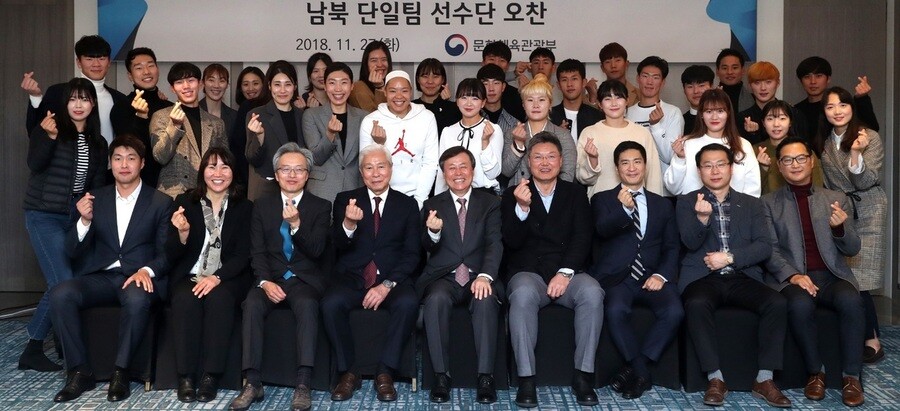hankyoreh
Links to other country sites 다른 나라 사이트 링크
Increasing number of unified Korean sports teams forming since Pyeongchang Olympics

Unified inter-Korean teams have been on the rise since the formation of a combined women’s ice hockey team for the Pyeongchang Winter Olympics last February.
A unified women’s team competed in the semifinals at the World Team Table Tennis Championships in Sweden last May, while a combined mixed doubles team competed at the Korea Open in July. A unified basketball team in August was followed by other teams in women’s basketball, rowing, and canoeing at the Asian Games in Jakarta/Palembang last September. As the momentum has continued to build, plans were set to field a unified inter-Korean men’s handball team at the world championships in Demark and Germany next January.
While political talks remain bogged down, inter-Korean sports exchange is poised to take over the peninsula through the 2020 Summer Olympics in Tokyo, the 2021 Asian Winter Games (where Gangwon is currently being pushed as a host site), and the 2022 Winter Olympics in Beijing.
Through inter-Korean athletic talks, the South Korean government and Korean Sport and Olympic Committee (KSOC) have been trading views with North Korea on other potential events where unified teams could be created. The discussions have focused mainly on team events, with a unified women’s soccer team at the 2020 Tokyo Olympics seen as potentially having a major ripple effect.
The South Korean women’s soccer team has yet to compete in the Olympics. With two slots remaining for Asian countries besides host Japan, they could end up with a spot in the main competition as a unified team. The possibility of another combined ice hockey team at the 2021 Asian Winter Games is also expected to come up for discussion. The Korea Ice Hockey Association (KIHA) is currently researching a unified team project with an eye toward the 2022 Winter Olympics in Beijing.
The creation of unified teams is an area where interests remain sharply divided depending on the sport. In the case of men’s football, opposition to a unified team remains strong among the players, leaders, and fans. In other sports such as women’s hockey, women’s basketball, table tennis, or rowing where combined teams have already been formed, a consensus has emerged between the South and North Korean sides.
The days when governments were able to play an active role in organizing unified teams are in the past. These days, they stand to face an increased backlash when teams are hurriedly slapped together. A more suitable role would be to create the right environment for inter-Korean sports exchange to take place, helping out naturally as the conditions take shape. The government should also listen heed the advice of people from the sports community. Once enough trust has been built for South and North Korea to co-host the Olympics in 2032, unified teams can represent the peninsula in multiple events.
On Nov. 27, Minister of Culture, Sports and Tourism Do Jong-hwan met with unified team competitors from the Asian Games and leaders at a downtown Seoul hotel to share a message of encouragement.
“Sports exchange efforts like [the unified teams] at the Pyeongchang Olympics and in women’s basketball have made a great contribution to peace on the Korean Peninsula. Shouldn’t sports make even more contributions going ahead?” he was quoted as saying. If this is the government’s position, then its ideas also need to change accordingly.
By Kim Cham-geum, staff reporter
Please direct comments or questions to [english@hani.co.kr]

Editorial・opinion
![[Column] Has Korea, too, crossed the Rubicon on China? [Column] Has Korea, too, crossed the Rubicon on China?](https://flexible.img.hani.co.kr/flexible/normal/500/300/imgdb/original/2024/0419/9317135153409185.jpg) [Column] Has Korea, too, crossed the Rubicon on China?
[Column] Has Korea, too, crossed the Rubicon on China?![[Correspondent’s column] In Japan’s alliance with US, echoes of its past alliances with UK [Correspondent’s column] In Japan’s alliance with US, echoes of its past alliances with UK](https://flexible.img.hani.co.kr/flexible/normal/500/300/imgdb/original/2024/0419/2317135166563519.jpg) [Correspondent’s column] In Japan’s alliance with US, echoes of its past alliances with UK
[Correspondent’s column] In Japan’s alliance with US, echoes of its past alliances with UK- [Editorial] Does Yoon think the Korean public is wrong?
- [Editorial] As it bolsters its alliance with US, Japan must be accountable for past
- [Guest essay] Amending the Constitution is Yoon’s key to leaving office in public’s good graces
- [Editorial] 10 years on, lessons of Sewol tragedy must never be forgotten
- [Column] A death blow to Korea’s prosecutor politics
- [Correspondent’s column] The US and the end of Japanese pacifism
- [Guest essay] How Korea turned its trainee doctors into monsters
- [Guest essay] As someone who helped forge Seoul-Moscow ties, their status today troubles me
Most viewed articles
- 1[Column] The clock is ticking for Korea’s first lady
- 2Hong Se-hwa, voice for tolerance whose memoir of exile touched a chord, dies at 76
- 3After 2 months of delayed, denied medical care, Koreans worry worst may be yet to come
- 4[Column] Has Korea, too, crossed the Rubicon on China?
- 5US overtakes China as Korea’s top export market, prompting trade sanction jitters
- 6[Correspondent’s column] In Japan’s alliance with US, echoes of its past alliances with UK
- 7All eyes on Xiaomi after it pulls off EV that Apple couldn’t
- 8Samsung barricades office as unionized workers strike for better conditions
- 9[Photo] Smile ambassador, you’re on camera
- 10[Correspondent’s column] The US and the end of Japanese pacifism